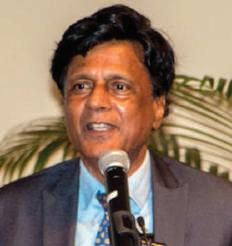
4 minute read
Armed bandits shoot Berbice man during home invasion
Constitutions, Constitutionalism and Constitutional Engineering
Constitutional “reform” was promised by the incumbent PPP Government in their 2020 manifesto, and the Attorney General has assured us the process has been launched. The APNU/AFC coalition had also done the same in 2015, but after a brash start, they deep-sixed the initiative.
However, since it appears that both major political forces agree that even though the present Constitution was extensively overhauled from 2000, it needs a further major overhaul. Some, like the writer, believe the entire document ought to be scrapped, since there remain the contradictions of the 1980 “cooperative socialism” cant (Art 1: “Guyana is…in the course of transition from capitalism to socialism”; Art 18: “Land is for social use, and must go to the tiller”) and the ideological telos, as indicated by the protection of the property rights, which favour the extant neoliberal realities.
Ravi Dev

Constitutions describe the authoritative allocation of state powers among the various branches, as defined by the Constitution itself; prescribe the rules by which those powers would be conferred, and also include procedures by which the Constitution may be altered. In a fundamental sense, therefore, it is, or should be, the embodiment of a social contract crafted by the people of a country for their governance. In a divided society such as Guyana, it is critical that the institutions created by the social contract are seen as just: “justice is the first virtue of social institutions as truth is of systems of thoughts.”
It is ironic that the British, with their stress on the rule of law, do not have a written constitution. The anomaly, however, should remind us that rules, in and of themselves, may be necessary, but are not sufficient to ensure a harmonious social order. The rules have to be embedded within, and be supported by, a wider political culture that gives life to the rules. This British idiosyncrasy of doling out written constitutions to its colonies while refusing to do the same for itself masked the reality of the need for the development of the wider network of informal traditions, accommodations, informal pro quid quos that make the British unwritten constitutional rules function.
Western constitutionalism arose out of the struggle for personal freedom and escape from arbitrary political will. We should certainly resonate with this struggle. Constitutionalism is a foundation stone of Liberalism, and defines a political scheme in which law, rather than men, is supreme. Political authority is exercised according to law - not vigilantism, as in Hopetown recently - which is obeyed by all, including the governors, who cannot depart from it by whim.
The American framers of the first written constitution appreciated, as we Guyanese should after our recent history, that the fundamental problem of organized society is of the use and abuse of power - how men may best prevent its abuse, and direct it to good ends. This notion is rooted in the fallibility of man…the belief that no man or group of men is good enough to be entrusted with absolute power over other men. We have unfortunately experienced that this tendency is exacerbated when a country has groups that are deeply divided, since it becomes so much easier to demonise the “other” and resort to extreme measures to assert one’s position. We are in the throes of one such campaign.
Since the constitution of a country allocates and limits the powers devolved by the citizens of that country to the institutions of the state, and also specifies the rules and procedures for selecting officers who are to authoritatively exercise such powers, the incentives for creating a New Political Culture would have to be built into a constitution.
“Constitutional Engineering”, i.e. to use the Constitution as a tool to engineer political behaviour of the political participants: “engineer”, as Webster reminds us: “to use tact, craft or ingenuity to achieve a result”, is now a major tool in the kit of state building and functional political behaviour. The premise is that the rules of the political system should accomplish three tasks: institutionalise moderation on divisive ethnic themes, contain their destructive tendencies, and pre-empt the centrifugal thrust of ethnic mobilisation. We have to agree on our equitable democratic objectives, and choose institutions which may deliver them, and then incorporate them in our constitution.
Fortuitously, our new demographics, in which no ethnic group has a guaranteed majority, should facilitate moderation by rational politicians to secure office.
A40-year-old man was shot and injured after he confronted armed bandits who invaded a Cumberland Village, East Canje, Berbice home on Friday night.
Injured is Jagdeo Phillips called “Zacaria”, a farmer of Lot 201 Victoria Street, Cumberland Village. Saturday was his 40th birthday.

According to the Police, Phillips was at the Lot 194 Victoria Street residence of a 68-year-old businesswom- an, who operates a shop from her home.
At about 09:50h, Phillips was in a hammock in the yard while the businesswoman and her granddaughter were in the shop, when one of the four armed bandits entered and held the teenager at gunpoint. He demanded cash and jewellery.

While they were in the shop, a loud explosion suspected to be a gunshot was heard outside.
The injured man’s teenage son, Lakraj Sudish, recalled that he was bathing when he heard screams and rushed to investigate.
“When I rush in the kitchen there was two man. One of them point the gun towards me and one of them point the gun towards my sister,” Sudish said, noting that his sister is 14 years old.
“Them asked me what I would do. Meanwhile, two of them was outside with my father, they was fighting. I think the gun was plastic gun but when I hear the first shot – that was real gun. I had picked up a fork but after I hear the first shot, I drop down the fork. So, ah tell them look the money there, you all collect what you all want to.”
TURN TO PAGE 31








